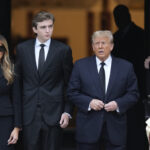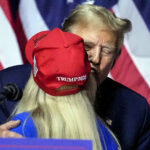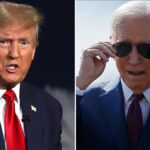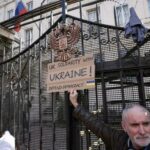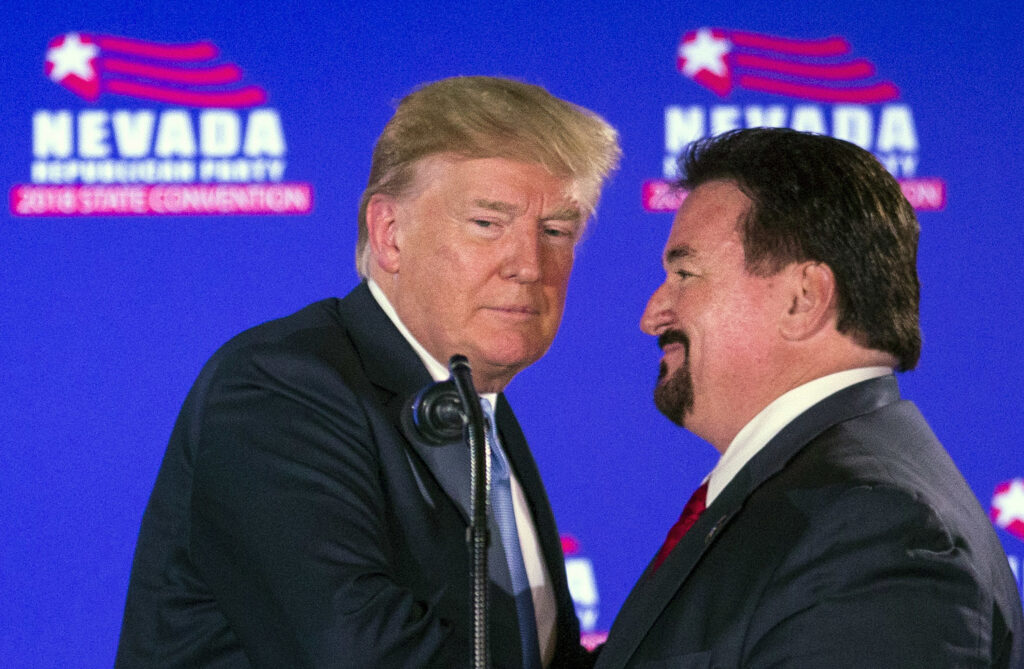
Nevada, one of the four traditional early nominating states, has been unusually quiet and devoid of campaigning during the lead-up to the Republican presidential caucuses next month, considered a near-certain win for former President Donald Trump.
A state that typically garners a great deal of attention, as both an early nominating and a swing state, was uncharacteristically deserted by presidential candidates, which has been attributed to a confusing battle between the state and its Republican Party.
ELECTION 2024: FOLLOW LATEST COVERAGE
The conflict was prompted by a 2021 state law that requires a state-run primary to be held. However, the Nevada Republican Party was not comfortable ceding control of its nominating process to the state government and decided to hold its party-run caucuses instead. The primary will occur on Feb. 6, followed by the caucuses on Feb. 8.
Republicans had attempted to sue the state to stop the state-run GOP primary but were unsuccessful. Nevada Republican Party Chairman Michael McDonald spoke to the Washington Examiner and expressed skepticism about the state’s election laws and security in describing the decision to continue with its caucuses.
The caucuses will determine how delegates are awarded, rendering the primary essentially meaningless in the GOP presidential nominating contest.
Trump, alongside Gov. Ron DeSantis (R-FL), entrepreneur Vivek Ramaswamy, former New Jersey Gov. Chris Christie, Gov. Doug Burgum (R-ND), and pastor Ryan Binkley, chose to file for the caucuses. Just Trump and Binkley remain on the ballot, as the rest have dropped out, most endorsing Trump.
Former United Nations Ambassador Nikki Haley, Sen. Tim Scott (R-SC), former Vice President Mike Pence, and a few lesser-known candidates chose to file for the state-run primary.
Haley is expected to win the primary, but McDonald explained that the contest is more of a “participation trophy.”
“The next state is Nevada where I have 100%,” Trump told reporters during a Tuesday stop at a New Hampshire polling location.
He referenced the decision of some opponents to avoid filing for the state’s caucuses. “They all pulled out when they looked at the polling,” he said. “So I have 100%. A lot of delegates — big state.”
“She knew she couldn’t have beaten Trump,” Nevada Republican strategist Zachary Guymon said of Haley. Instead, he suggested she wanted to be able to point to the results of the “state-paid-for straw poll,” which she will likely win. “And there’s going to be a footnote below each one saying that doesn’t really count,” he said.

“The decisions by Haley’s, Pence’s, and Scott’s campaigns to file for the Nevada primary and not the Republican caucuses was a function of how seemingly locked down Trump has the party-run caucuses,” FrontloadingHQ political scientist Joshua Putnam said. “The bet was, at filing time last October, that Trump would dominate the caucuses and that it was better to cede the state to him rather than be embarrassed.”
The benefit, he said, of participating in the state’s primary would be that the candidate could tout receiving more votes in the contest than were cast for the winner of the caucuses “if not all the caucus votes combined.” But, he reiterated, “A win there would not bring any delegates.”
To those who have previously suggested the caucuses in Nevada were going to be essentially fixed in favor of Trump, Guymon said opting for the caucuses “was not a way to rig the caucus for anybody.”
“The caucus is a fundraising mechanism that gets money in — that raises money for the party,” Guymon said.
“Trump was going to win whether it was a primary or a caucus,” he said, but the tradition of caucusing and the fundraising it does for the state party were the drivers of the decision.
Guymon claimed campaigns missed the mark by ignoring Nevada, including DeSantis, who staked his funds and campaign on Iowa.
“Nevada is not a winner-takes-all state,” Guymon said. Candidates had the opportunity to spend time courting voters, spending less money than in other states, “and actually been able to walk away with what matters, which is the delegate race.”
Nevadans detailed to the Washington Examiner the lack of television ads, direct mail items, and campaign events that were conversely plentiful across Iowa, New Hampshire, and South Carolina.
Candidates did not bother courting Republicans for their support, effectively surrendering the state and all of its delegates to Trump, who maintained 73% of Republican caucusgoers in an early January measure. The poll showed Trump 65 points over his closest competitor in the caucuses, DeSantis, who saw just 8%.
Now, as DeSantis has suspended his presidential bid and Haley chose to file for the state-run primary rather than the party-run caucuses, putting her out of contention for any delegates, Trump stands to sweep Nevada.
“It would appear everyone has totally ceded the state to Trump,” Nevada Republican strategist Jeremy Hughes said.
In a Tuesday memo from Haley’s campaign manager, Betsy Ankney, she charted Haley’s path to the White House, leaving out any mention of Nevada, where the next nominating contest will be.
“First up is Nikki’s home state of South Carolina,” Ankney wrote. “After South Carolina, we head to Michigan, which also has an open primary, followed by a closed primary in Washington, DC, and caucuses in Idaho and North Dakota.”
According to Nevadan and Republican strategist Corinne Clark Barron, voter contact efforts from Haley and DeSantis did not rise above “digital — emails and texts.”
“I haven’t witnessed any doorknocking or in-person attempts to sway voters, but to be fair, the weather hasn’t really been great for that recently,” she said.
As for the former ambassador, who remains Trump’s biggest competition in the 2024 race, University of Nevada, Las Vegas political science professor David Damore said, “I cannot even recall if Haley has come to the state.”
Haley’s complete shunning of Nevada was reiterated by others who spoke with the Washington Examiner, including McDonald, who said he reached out to her campaign several times but never heard back.
Haley’s campaign did not provide comment after repeated requests from the Washington Examiner via email and phone.
CLICK HERE TO READ MORE FROM THE WASHINGTON EXAMINER
McDonald said the lack of attention given to Nevada Republicans has been very disappointing.
“The taking of the voter in Nevada for granted and just writing them off is disheartening,” he said.
